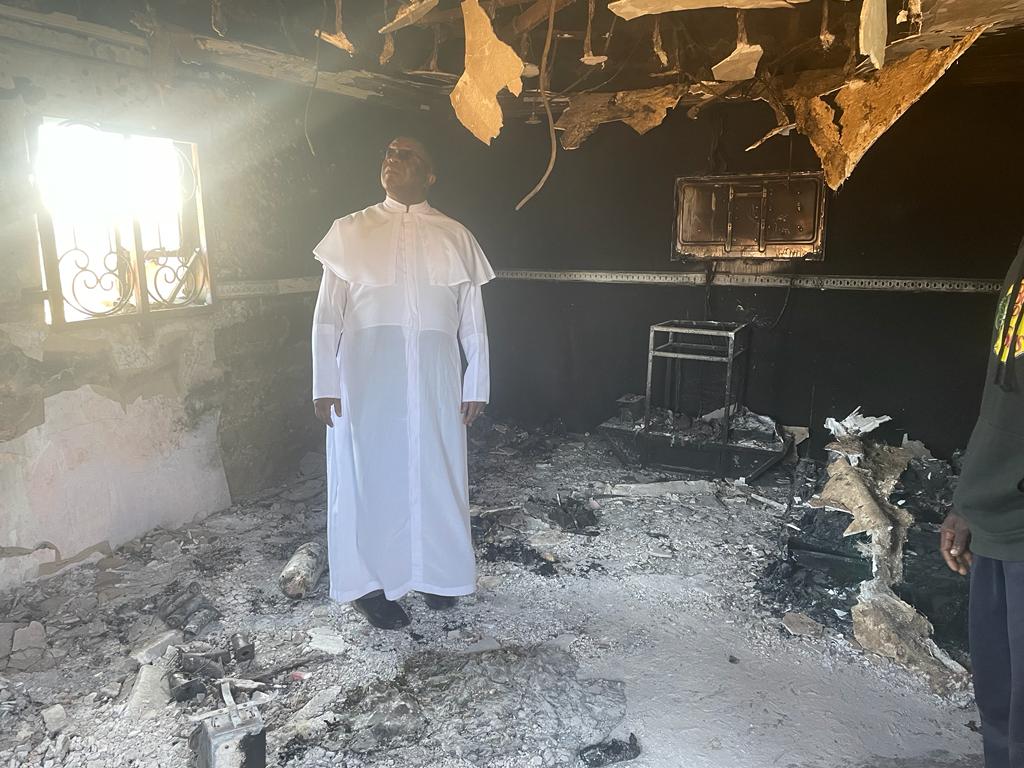
https://catholicherald.co.uk/twenty-nine-nigerian-christians-slaughtered-in-three-day-pogrom/
Suspected Fulani Islamist militants carried out on a three-day massacre in Pankshin Diocese in Nigeria’s Middle Belt, killing 29 Christians, injuring a further two, and burning down churches and houses.
The attacks took place across the villages of Kopnanle, Mandung, Bokkos Town and the Mbar district of Bokkos.
Speaking to Aid to the Church in Need (ACN), the Catholic charity for persecuted Christians, Father Andrew Dewan, director of communications in Pankshin Diocese, gave exclusive details about the attack.
He said: “The attacks started on Friday and carried on right through Saturday and into Sunday. Unusually, on Sunday the attacks took place in the morning and afternoon.
“This is a deviation from the attackers’ usual methods of striking only at night. It’s now taking place in broad daylight, when people expect it less.
“These attacks are designed to drive away the owners of the land, so the Muslim extremists can take over. The area is overwhelmingly populated by Christians, and the militant attackers need space to propagate their religious beliefs.
“These attacks follow the same pattern as previous attacks.
“There are religious and ethnic components, all mixed up together. When you look at the patterns of these attacks, over time it paints a clear picture.
“How can this be explained, except in terms of a religious conflict? These attacks build on the Christmas and Easter attacks.”
On Easter Monday, suspected Fulani extremists launched an attack in the Middle Belt, killing 10 Christians, including a pregnant woman and her unborn baby.
In a four-day killing spree beginning on 23rd December, suspected Fulani militants attacked 26 villages in Bokkos claiming the lives of more than 300 Christians.
Father Andrew denounced the Nigerian Government’s response to the attacks: “There is inaction from the government to this conflict at all levels. The primary purpose of government is to protect lives and property, and they have not done well in this regard.
“Most of the things said in the immediate aftermath of the Christmas Eve attacks are yet to be implemented. The promises the government has made amount to nothing but hot air.”
Following the Christmas attack, Nigerian President Bola Tinubu issued a statement announcing security agencies had been ordered into the area to apprehend the culprits, and that emergency relief resources had been mobilised for survivors.
Father Andrew commented on this, stating: “There is no indication that any attackers from the weekend, Easter or Christmas have been apprehended. There has been no such report. Where arrests are made, sooner or later those attackers are set free.
“The attackers continue, and the victims say enough is enough. The hope was the government would protect them. That isn’t happening, so communities are organising to protect themselves because the government and elected officials aren’t doing that.
“The military and police are either overwhelmed and unable to guard citizens, that’s why these things go on unabated.”
Commenting on the atrocity, chairman of Bokkos Cultural Development Council Vanguard, Farmasum Fuddang, said: “Despite the presence of security forces, including the DSS [Department of State Services], army, and police, the perpetrators, identified as Fulani terrorists, were allowed to carry out their attacks with impunity.
“Under the cover of darkness, more than 50 armed terrorists descended upon the villages of Mandung-Mushu and Kopnanle, targeting innocent, unarmed, and peaceful residents as they slept… while nearby soldiers failed to intervene.”
He continued: “This brazen attack, which predominantly targeted children, appears to be part of a calculated effort to instill fear and drive perpetuate further displacement within our communities.
“The timing of this attack, following closely on the heels of the DSS’s erroneous warning of an impending assault on Fulani communities, raises serious concerns about collusion or deliberate neglect.”
Father Andrew highlighted the gravity of the situation facing his diocese.
He said: “Life is seen as so cheap, but it’s the most precious gift of all. We’re still dealing with a backlog of IDPs in our community.
“The diocese is overwhelmed with people and victims. We’re dealing with widows, payments for children’s school fees, accommodation.
“The diocese alone cannot shoulder this. This is an emergency, these problems are still unfolding and ongoing and nothing seems to change.”
